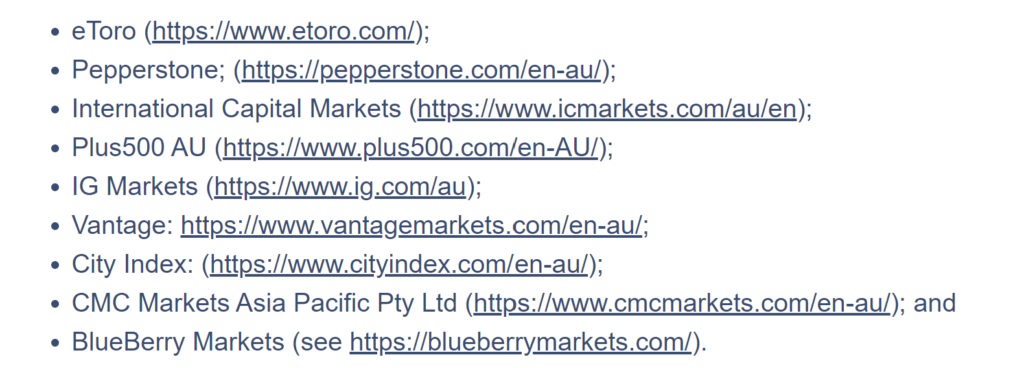Towards the end of last year, we looked at a prospective legal case in Australia involving IG Group. To summarise, a law firm was looking to raise money to represent a large group of former clients who said they were missold CFDs and shouldn’t have been able to trade in them.
This ended up being one of the most ‘liked’ posts in CFDs Weekly history, presumably because readers were very concerned about one of their peers and wanted to raise awareness about what they saw as a deep miscarriage of justice.
Last time we reported on that case it was only a tentative one. Now the firm that was trying to pursue the case, Piper Alderman, has actually commenced proceedings, meaning IG has to go to trial.
Not long after this happened, another company – Banton Group – announced that they would be launching a competing class action lawsuit. Although IG’s Australian entity is named here, so too are the companies below:

The ambulance chasers, or ‘lawyers’, at Banton argue that they are likely to be given precedence in the case, because the fee structure for their suit is superior to that of the one being flogged by Piper Alderman.
To put that in simpler terms, if different legal firms filing the same class action lawsuit cannot agree to work together, the court will effectively award it to one of them, based on what they perceive as being in the best interest of the people being represented. Banton says it will take lower fees than Piper Alderman can, so the people being represented will get more money if they win, hence their belief that they’ll be the ones chosen to represent them.
Although the case now seems to be moving forward, the basic argument I made here at the end of last year hasn’t changed. First of all, the people filing the case seem to be, perhaps ironically, following the logic of scammers.
Someone that has lost money via something like CFDs or even stock trading, is probably going to be annoyed about it and feel like they were screwed over, even if they were given all the adequate warnings as to how risky an activity it is. They are thus more likely to be taken in by someone that says they are correct to feel aggrieved and can help them get their money back.
My view is that the lawyers in this case are essentially following this logic. They have found a group of people that are eager to pursue a case because they feel like they got screwed over. The lawyers will get paid regardless of the outcome, so it is a win-win situation for them, but not for people that lost money.
As to the actual logic behind the case, its premise seems to be that the clients lost money, therefore the products weren’t suitable for them. Determining suitability on the basis of whether or not you made money is obviously impossible. It creates a kind of brain numbing circular reasoning – you can only be approved to trade if you are profitable, but in order to be profitable you need to be approved to trade.
The other thing the lawyers are hyping up is the restrictions on CFDs that ASIC introduced in 2021, with the implication being that IG should have followed these laws. As with the above, this seems totally illogical – how can you adhere to laws that don’t exist? Alas, I doubt individuals in the Australian legal system will be listening to me.
The final point to keep in mind is the fact that it will be bad for all brokers in Australia if IG does lose. As the image with all the broker names indicates, exactly the same logic will be applied by courts to all clients at all brokers if they do lose. So all those people enjoying the schadenfreude of seeing a peer suffer today, remember, it could be you tomorrow!
But perhaps the greatest irony is that no offshore brokers will be affected by the case because actually taking them to court is presumably much more difficult or even impossible. So in this instance, companies that actually bothered to get regulated and do things, at least ostensibly, by the book, are more likely to get shafted by people that just went to Vanuatu or the Seychelles.
Can brokers even go public?
Last week we looked at the prospective ThinkMarkets IPO. Looking through those filings got me thinking – how many providers in the industry today could actually hold an IPO if they wanted to?
CFDs Weekly is a judgement free zone and so while we aren’t trying to be narks or cast any aspersions on brokers that do engage in the following sorts of activities, I can say with 100% certainty, having had a couple of relevant conversations, that institutional investors would not want anything to do with it.
To give an example of what I’m talking about, imagine if you are a broker that generates a double-digit percentage of its revenue from Japan. Now imagine you do not have a regulatory licence to operate in Japan.
If you are putting your prospectus or Q1 update together and have to say, ‘yes we make 20% of our revenue in Japan’ and then have a page where you list all your licences and Japan is nowhere in sight, this is probably not going to end well for you.
The same logic applies to many of the emerging markets that providers are targeting. Most of these countries do actually have a regulatory framework under which providers are supposed to operate, it’s just that most brokers ignore it and continue to do business anyway.
“We make loads of cash in Indonesia and Botswana and aren’t regulated there because we think the regulator won’t do anything to us” is also unlikely to go down well among most serious investors.
If this logic holds, and the result is that brokers struggle to go public, it makes you wonder what will actually happen to a lot of companies in the sector. Assuming that a broker’s owners want to cash out but cannot go public, then they are basically limited to being acquired by another company or private equity firm.
However, the owners would probably have to rule out an acquisition by a listed company because that firm wouldn’t be able to run the acquired business for the reasons mentioned above. So they may end up being limited in terms of who is able to actually acquire their business as well.
All of these things would presumably put downward pressure on your valuation. For instance, if you do go public and appetite is muted, that means a lower valuation. If you are acquired by a listed business, and they envisage having to make substantial investment to get your firm ‘up to scratch’, that will crimp the valuation. And if neither of those options are viable and you have to find a very specific buyer, and that buyer knows your options are limited, that is also going to put downward pressure on your valuation.
This is all very theoretical but it makes you wonder – are a lot of broker owners going to end up sitting in a gilded cage or with a much lower valuation multiple than they want when the time comes to cash out?
Libor podcast
I hesitate to send readers to non-CFDs Weekly-related websites but last week I listened to a podcast with Tom Hayes, the UBS trader who went to prison for manipulating Libor. It increasingly seems as though Hayes was made into a scapegoat and that many people involved in his prosecution either lied or misled the court. The interview is with Izzy Kaminska, who was the editor of FT Alphaville, and is really worth a listen.




[…] we noted last week, the most popular strategy for lots of brokers in markets like Korea is “stay offshore and keep […]